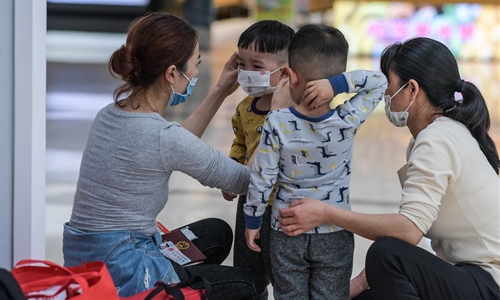HOME >> CHINA
Shanghai has taken decisive measures to protect seniors and children
By Du Qiongfang Source:Global Times Published: 2020/2/11 17:47:21

A woman helps a child wear a mask at the Haikou Meilan International Airport in Haikou, South China's Hainan Province on January 25. Hainan has suggested all residents and tourists to wear masks outdoor to prevent the spread of novel coronavirus. Photo: Xinhua
During the critical stage of the fight against the epidemic of novel coronavirus pneumonia in Shanghai, protecting local senior citizens and children becomes particularly important, and Shanghai Civil Affairs Bureau has decisively taken a series of measures to perfect the social services for the elderly and safeguard children.
Considering the relatively weaker resistance to diseases, the bureau has given priority to the prevention and control of the epidemic in local nursing homes and children’s welfare centers.
Every nursing home employee who visited their hometown for the Spring Festival has to go through a 14-day quarantine on return, irrespective of their hometown located is a key area of the epidemic or not.
Elderly citizens who left the nursing home for the holiday also have to adhere to the quarantine period before they are allowed to come back.
All the nursing homes in Shanghai have suspended the visits from the relatives of the elderly and instead helped the elderly to contact their family members via video chat and telephone to comfort and pacify them.
At present, all the 804 functional nursing homes in Shanghai update and report the number of the elderly, including the returnee employees.
During the epidemic prevention and control period, room service for delivering food at the doorsteps of the senior citizens who live alone and have difficulty walking will continue.
According to the bureau, the local civil affairs department has launched all kinds of measures to take care of the children whose guardians are quarantined after being confirmed or under suspicion of NCP infection.
Meanwhile, the local children’s welfare institutions adopted strict entry-exit regulation during this epidemic prevention and control period.
Most children at the institutions are either critically ill or disabled. In order to better protect them, the institutions have suspended entry of all visitors, including all children activities outside the institution’s premises. Besides, every institution has worked out emergency plans for the prevention and control, and to regulate the care meted out to the children during the epidemic outbreak.
In addition, social service providers offering daily care and rehabilitation training to children with special needs, such as those diagnosed with autism, cerebral palsy, and Down syndrome, have suspended their offline services in order to avoid cross-infection.
RELATED ARTICLES:
Posted in: SOCIETY